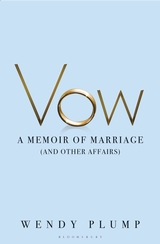 A Memoir of Marriage (and Other Affairs)
A Memoir of Marriage (and Other Affairs)
Published by Bloomsbury 14 March 2013
272pp, paperback, £12.99
Reviewed by Caroline Sanderson
‘Infidelity is firmly attached to the sin and damnation side of the table of elements, and no-one wants to go over there for a closer look.’ Well, I’ve been taking a very close look at infidelity recently, and lest my husband reads this and jumps to conclusions, it’s because this spring sees the publication of several books which subject the squeamish matter of extra-marital affairs to the kind of sober scrutiny, all too rare amid gleeful daily tabloid exposés of celebrities and politicians caught in flagrante.
Lucy Dent’s Turned On (Doubleday, March 2013) is a profoundly discomfiting memoir of how one restless woman’s chatroom flirtations turned into an addiction to virtual sex, and then marriage-wrecking obsession. Dent tips out a whole trunk of dirty linen, as she lays bare marital disharmony, loneliness and sexual discontent in a somewhat tortuous read, from which it’s nevertheless very hard to look away.
In Our Cheating Hearts: Love & Loyalty, Lust & Lies (Virago, May 2013), Kate Figes couples real-life testimonies from those who have ‘cheated’ and those who have been cheated on, with extensive research and trenchant analysis, to examine why people have affairs, and what being ‘faithful’ means. It’s a very thought-provoking book, which questions why absolute fidelity in sexual love is now regarded as the primary symbol of commitment, regardless of whether or not it is realistic for most of us.
But for a raw, 360◦ anatomy of infidelity, with all its domestic-splintering consequences on both adults and children, Vow is the book to read. In 2005, Wendy Plump, a US journalist, discovered that her husband – to whom she had been serially unfaithful herself – had not only had an affair but established a second family living only a mile away. In this ruthlessly self-reflective memoir, Plump dwells on the ordeal of Finding Out, the ebb and flow of passion, lies and alibis, as she attempts to deconstruct the allure of illicit attraction. She offers few antidotes to its pull, because – as she herself admits – she has found them hard to come by.
With three in her marriage early on, as she succumbed to her first affair, Plump felt paradoxically isolated. ‘There was no trusted ally to go to and ask: “What the hell is this feeling, and why do I have it?” ’(the very question which prompted Figes to write her book). She quickly realized that there is a high price to be paid for infidelity. ‘Finding out about an affair will blow you into a state that is something like post-traumatic stress. Committing one will be a lower frequency of the same, half-deranged state of unease.’ But does this stop her? Of course it doesn’t. In the course of her marriage, she has affairs with four different men.
Plump writes very well of what was essentially her addiction to The Other, and ‘the drug and energy of passion, of new intimacy…You do it all on the sly, and you steal from your own cupboards to cover the cost.’ And it all seems worth it at the time because adultery can be ‘transformational’, allowing you to experience life ‘at full tilt’ once again. Feeling unsympathetic so far? Understandable. Plump’s husband was no wife-beater. In fact her marriage was far from terrible, just one with a ‘dispiriting trajectory’, for which nothing had prepared her. Before she knew it, the relationship was ‘sifting out’ from under her, like ‘quicksand’. Cast the first stone if you wish.
Lionel Shriver gave Vow a right pelting in a recent Guardian review, and not just for moral reasons. ‘Plump suffers from a far greater failing than marital turpitude: she can’t write,’ she wrote, taking Plump to task for her ‘self-help clichés’. Well actually, this whole sad story, and many others besides are the result of one whopping great cliché: the fact that we expect marriage to be ‘this unbreakable, perfect vessel’, as Kate Figes puts it. And Plump has a lot of insights to offer into the irreparable breakages that inevitably result. ‘Affairs,’ she writes, ‘never end well.’ No marks for stating the bleeding obvious. But plenty for realizing that this is a truism that needs exploration. Especially given the extraordinary dearth of any practical guides to marriage trauma, which leaves us to ‘wander around in the marital labyrinth and mark out the best path we can.’
Plump prefaces Vow with a short epigraph from W.H. Auden: “Hunger allows no choice…” Whatever her motivation for writing this book, I admire her for being honest enough not only to confess her own hunger but to attempt to figure out why she wasn’t feeling fed. After all, there, but for prolonged eye contact with a nutritious-seeming Other, go a hell of a lot of us.
